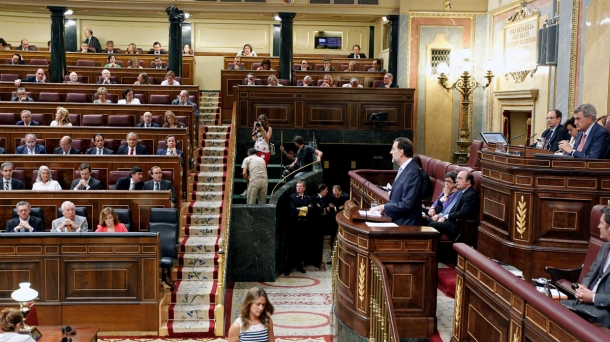news
Austerity measures
Rajoy raises sales tax 3 percent from 18 to 21 percent
AP
Madrid
Spain has announced a 65 billion euros austerity package that includes tax hikes and spending cuts a day after it won approval from its euro partners for a bailout of the country's stricken banks.
-

Mariano Rajoy in the Spanish parliament. Photo: EFE
Spain's government heaped further austerity measures on the country Wednesday as it unveiled sales tax hikes and spending cuts aimed at shaving 65 billion euros ($79.85 billion) off the state budget over the next two and a half years.
A day after winning European Union approval for a huge bank bailout and breathing space on its deficit program, Prime Minister Mariano Rajoy warned Parliament that Spain's future was at stake as it grapples with recession, a bloated deficit, investor wariness of its sovereign debt.
"We are living in a crucial moment which will determine our future and that of our families, that of our youth, of our welfare state," said Rajoy.
"This is the reality. There is no other and we have to get out of this hole and we have to do it as soon as possible and there is no room for fantasies or off-the cuff improvisations because there is no choice."
Wednesday's increases in sales tax include a 3 percentage point hike on products and services like clothing, cars, cigarettes and telephone services to 21 percent and a 2 percentage point increase on goods such as public transport fares, processed foods and bar and hotel services to 10 percent. The sales tax on basic goods like bread, medicine and books stays at 4 percent.
Other measures taken included the scrapping of a customary Christmas payment for civil servants.
The increases were widely expected but go against campaign pledges made by Rajoy before he was elected in November and since he came to power.
Other measures outlined Wednesday included further cuts in government spending beyond the reductions already outlined in the 2012 budget, wage cuts for civil servants and members of the national parliament, further closures of state-owned companies, tax deductions for homeowners to be scrapped, a 30 percent cut in the number of town councilors, changes to unemployment benefits designed to encourage jobless people to seek work quickly and 20 percent cut in government subsidies to political parties and labor unions.
top stories



-
news
New anti-eviction law
Andalucia begins proceedings to seize confiscated houses from banks
-
news
London attack
British police ponder conspiracy after soldier murder
-
Sport
Giro d'Italia
Nibali tightens grip on overall lead after stage victory
© EITB - 2024 - Privacy Policy - Legal disclaimer - Cookie Policy - Cookie settings


